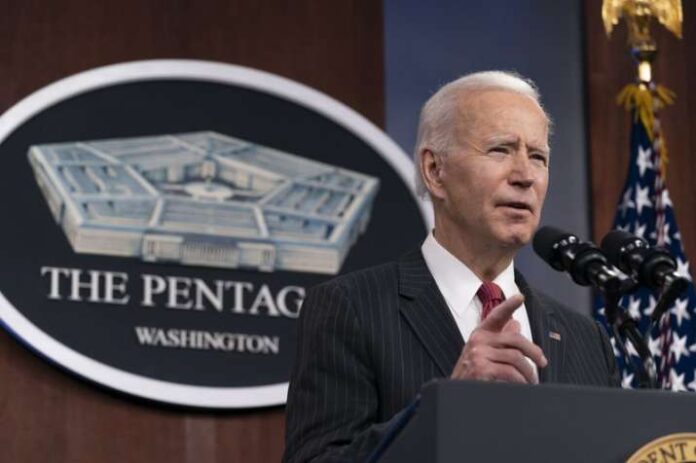| Translate This News In |
|---|
On Wednesday, Joe Biden said his first call to Xi Jinping as US president lasted for two hours, pressing the Chinese leader on trade and Beijing’s crackdown on Hong Kong democracy activists as well as other human rights issues.
The two leaders spoke just hours after Biden announced plans for a Pentagon task force to review the U.S. national security strategy in China and after the new U.S. president announced that following the coup in the southeast Asian country this month, he was levying sanctions against Myanmar’s military regime.
A White House statement stated that Biden raised concerns about the “coercive and unfair economic practises” of Beijing. Biden also pressured Xi on Hong Kong, Uighur, and ethnic minority human rights abuses in the western Xinjiang province, and his actions against Taiwan.
After the call, Biden posted on Twitter, “I told him that I’ll work with China when it benefits the American people.”
China’s state broadcaster CCTV struck a mostly positive tone about the conversation, saying that Xi acknowledged the differences between the two sides, and that these differences should be managed, but urged overall cooperation.
CCTV said Xi pushed back against Biden’s Taiwan, Hong Kong, and Xinjiang concerns, saying that China’s internal affairs and Chinese sovereignty are the issues. “The U.S. should respect the core interests of China and behave with caution,” he warned.
Biden, who, when serving as Barack Obama’s vice president, had dealt with the Chinese leader, used his first three weeks in the White House to make several calls with other leaders in the Indo-Pacific region. He tried to send the message that he would take a radically different approach to China than former President Donald Trump, who in the U.S.-China relationship placed trade and economic issues above all else.
Late last month, with Japanese Prime Minister Yoshihide Suga, Biden underlined the U.S. commitment to protect the Senkaku Islands, a group of uninhabited islets run by Tokyo but claimed by Beijing. Biden stressed the need for “close cooperation to promote a free and open Indo-Pacific” in his call to India’s Prime Minister, Narendra Modi. And in his appeal last week to Australian Prime Minister Scott Morrison, the president pointed out that the alliance of the two nations was essential to the region’s stability, the White House said.
According to a senior administration official who spoke on condition of anonymity to discuss private calls, top aides to Biden have repeatedly heard from Asia-Pacific counterparts who were discouraged by Trump’s often sharp rhetoric aimed at allies, talk of lowering troop levels in South Korea, and odd interactions with North Korean dictator Kim Jong Un.
According to the official, allies in the region have made clear that they want a more purposeful and steady approach to future commitments.
To that end, in their original interactions with their counterparts, Biden and other top administration officials have taken care to look at the long game in resetting the relationships.
Biden used the call on Wednesday to raise concerns about the crackdown by Beijing on activists in Hong Kong and about its policies in Xinjiang affecting Muslims and ethnic minorities. Secretary of State Mike Pompeo proclaimed in the final hours of the Trump administration that the Chinese Communist Party had committed crimes against humanity against the predominantly Muslim Uighurs and other minority groups.
In order to fight terrorism and a separatist movement, China has denied any abuses and says the steps it has taken are necessary.
The White House also said that Biden made his concern about Beijing’s increasingly “affirmative” Taiwan action clear. Beijing claims full sovereignty over Taiwan, even though, for more than seven decades, the two sides have been governed separately.
Days into Biden’s presidency, near the island, China dispatched warplanes. In turn, the U.S. Navy sent a guided-missile destroyer through a waterway separating China and Taiwan last week.
The discontinuation of Trump’s trade war with China, which resulted in tariffs on their steel, aluminium, and other products, is one area that Biden does not seem ready to move quickly on.
Officials in the administration say Biden also wants to consult with allies in Asia and Europe before making tariff decisions.
Biden and Xi are well aware of each other and have had frank exchanges.
During his 2012 visit to the United States, Biden played host to then Chinese Vice President Xi. Biden used the visit to get Xi to read and was blunt at times, even raising concerns during a luncheon toast about Chinese intellectual property theft and human rights abuses.
Biden has said that he believes there are areas where the United States and China can work closely, such as tackling climate change and preventing nuclear proliferation. But ultimately, Biden recently said, in the coming years, he expects the U.S.-China relationship to be one of extreme competition.
Chinese state broadcaster Xi told Biden on Thursday: “You’ve said America’s greatest feature is a possibility.” I hope that this kind of opportunity will develop in a way that promotes the improvement of relations between the two countries.


















